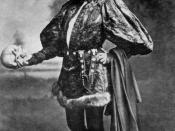"In the beginning, there was only silence," James Leeds says at the very beginning
of Children of a Lesser God, "and out of that silence there could come only one thing:
Speech. That's right. Human speech. So, speak!''' he could not have been more wrong.
In this opening speech, James appears to establish silence, and by extension
deafness, as "bad," and speech and sound (and hearing) as "good." This is the distinction
which most deaf people learn at a young age. Sarah learned this distinction from her
mother and her teachers, but chose as an adult to reject this explanation and
establish a definition of her own: "Deafness [is] a silence full of sounds ... the sound of
spring breaking up through the death of winter.'' The words that make this phrase
are beautiful; the signs that give this phrase life are deeply moving.
The struggle, then, throughout the play becomes one of making those who have
ears, however residual their hearing might be, able to hear.
Orin and Lydia have some
hearing - not enough to allow them to function in the hearing world without assistance
but some hearing nonetheless. Lydia has a crush on James and refuses to listen to
anything but her own heart strings. She is oblivious to how her behavior affects
Sarah and she will not listen to James's voice or Sarah's signs when they not so
indirectly talk to her about watching television.
Orin is deaf to anything that does not fit his vision of protecting the deaf. As a
deaf man who speaks relatively clearly and reads lips, Orin is a good candidate for one
to bridge the deaf and hearing worlds. But, he is entirely wrapped up in his
"cause": deaf teachers for deaf children. When James takes Sarah out...


